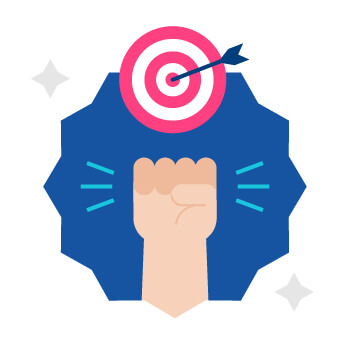4 Sales Skills that Guarantee Your Success (& Put You in the Top 5%)

Contents
What skills do you need to succeed as a salesperson? And if you’re hiring, what sales skills should you be looking for in your recruits?
Keep reading to learn the 4 skills that align most with success in sales.
How did I pick these 4 skills?
Over the past decade that I’ve spent in SaaS sales, I’ve hired more than 500 salespeople in every major market in the US, from New York to San Francisco.
Many of the people I’ve hired have gone on to do incredible things — like running big revenue organizations in Europe or growing business development at top companies in the Bay Area. Others never quite caught on in the SaaS sales space and have found homes in other industries or roles.
Throughout my career, I’ve always made time to pause and look back on the best of the best — the top 5% of people that I’ve had the pleasure of hiring in my career. Whenever I dig in, clear commonalities and trends began to emerge around the skills that these top reps possessed.
To be clear, this is not the “be all, end all” of skill lists, nor am I claiming that every top salesperson must have these four skills in order to be successful. I would, however, suggest that as a rep, you’ll have an increased likelihood of being in the top 5% of salespeople if you work on developing the following four sales skills.
Let’s dig in, shall we?
Sales Skill #1: Empathy
Empathy is typically defined as “the ability to understand and share the feelings of another,” and for salespeople, it’s an incredibly crucial skill.
As we move into 2020, buyers are more educated than ever, and because of that, they are much more likely to understand the feature differentiation between two products or services.
That’s where empathy comes in — understanding the true feelings of your buyer.
Great salespeople are able to position their product to solve their prospect’s business pain, to ease a concerned buyer, or to comfort their future customer’s worries.
It’s more difficult than it might appear at first.
Most of the salespeople I’ve coached are looking for that moment when they hear the prospect mention a challenge they know their product or service can solve. But when you are waiting for that “aha!” moment to start selling your product, it shows.
That’s not the right mindset, in my opinion.
The correct mindset is to listen intently and to be truly and completely interested in helping your prospects perform their job better.
When you listen and make suggestions while sharing the feelings of your prospect, you are much more likely to come across as a genuine person attempting to help someone they care for.
Sales Skill #2: Tenacity

I cannot tell you how many times I’ve watched the new hotshot sales guy or gal come into an organization, get some easy wins, and then flame out less than 6 months later.
Let’s be honest: Any above-average salesperson can close the easy deals — the buyers that have already decided to move forward, and you’re just guiding them across the finish line.
Where do top salespeople separate themselves?
- They work their entire pipeline with ferocious tenacity.
- They have a gameplan for the easy deals AND the not-so-easy deals.
- They have pursued the prospect like a private detective, adding value through multiple touchpoints and multiple channels.
- They make sure to remind the prospect of all of the challenges they face and how their solution maps back to solving them.
- They hunt. Hard.
Tenacity is often built into people. Sometimes, they have overcome challenges in their personal and professional life, and because of that, they have a “never give up” spirit.
I’m a firm believer that tenacity can be developed over time. It’s all about deciding what type of brand you want to build for yourself over the next 50 years of your career.
Who do you want to be? Is tenacity part of your brand?
Sales Skill #3: Organization
Sales is much more of a science and much less of an art than people believe. Because of that, it’s important that, as a salesperson, you know the science behind your success.
- How many times do you need to call your prospects to book a demo?
- How quickly after you give a demo do you need to secure a follow-up meeting?
- Once a contract goes out, how quickly does your win rate go down over time?
Once you know these answers (seek them out from your manager if you don’t have them), you can start optimizing your entire sales funnel to run as effectively as possible.
But remember, the only way to stick to the funnel metrics you’ve defined is to be as organized as possible.
The best reps I’ve ever worked with know exactly what they are doing every single day. They are diligent about notes in their CRM, and they live both their personal and professional lives out of their Google Calendar. They never miss a meeting, a phone call, or an opportunity for follow-up.
Create your own system for staying organized. I recommend a color-coded Google calendar and phenomenal attention to detail in your CRM. When you’re managing a pipeline of 40+ deals, you’ll thank me.
Sales Skill #4: Curiosity

As we move into the last of the four sales skills, we come across the most important skill for any top salesperson to have: curiosity. Curiosity has the tendency to take care of nearly everything else that you need to be successful in your role.
When you’re curious, you find answers.
When you’re curious, you seek out new tactics.
When you’re curious, you ask questions of other top performers.
This isn’t something to be done in the beginning of your career. It’s something to be done over your entire career. I’m nearly 20 years into my sales career, and every day I spend a much larger portion of my time asking questions than making statements.
Curiosity shows itself when you spend your time seeking out the information you need to be successful.
Are there simple questions where you can find the answer on Google? Find them. Are there resources on your company intranet that answer your question? Download them. Want to find out how the best people talk about a particular product in your bag? Hunt them down and buy them a coffee.
Curiosity is a small investment that pays massive dividends.
In Summary
Being a top salesperson is not an easy task. It comes with the responsibility of carrying a quota every month, quarter, and year. In order to be successful, you must be committed to becoming a master at your craft.
In order to give yourself the best shot at winning in your sales career, make sure you’re focused on developing these four crucial skills:
- Empathy – Truly understand your customer’s feelings.
- Tenacity – Be a detective and hunt hard.
- Organization – Stay on top of your pipeline by being organized.
- Curiosity – Never be satisfied without the answer.
There are many other skills that come into play as you’re developing into a top-performing salesperson. What are some of your favorites?





